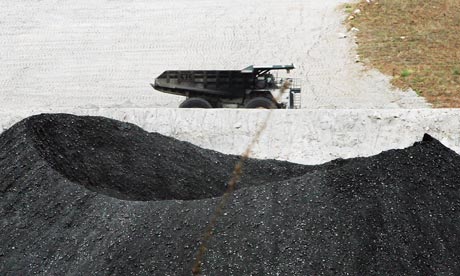Why Australia is vulnerable to both climate change and climate sceptics
The Lucky Country may feel the impacts of global warming particularly harshly, but the world's biggest coal exporter remains a haven for sceptics. Now scientists are fighting back

A coal truck at BHP Billiton's Mt Arthur coal mine in Muswellbrook, Australia. Photograph: Ian Waldie/Getty Images
by Stephan Lewanowsky, The Guardian, June 15, 2011
Australia is often cited as being particularly vulnerable to climate change, with projections of longer droughts punctuated by increasingly horrendous floods. In Western Australia, rainfall has already declined by 20%, and the tragic "Black Saturday" bush fires that claimed 173 lives in 2009 were amplified by an unprecedented heatwave.
It is less well known that Australia is also a coal "superpower," being the world's largest exporter of this dirtiest of all fossil fuels.
This tension between vulnerability and commercial stakes has created fault lines throughout Australian society and polity. Although the federal government is currently seeking to introduce a modest carbon price (around $20 per ton, or roughly five times lower than the current price in Sweden), other branches of government just proposed a $6bn coal port expansion.
Although Australia is blessed with an abundance of sunshine, the share of renewables in power generation has declined from 19% in 1960 to 7% in 2008. Australia now emits more CO2 to generate a unit of power than all but three other countries; only Botswana, Cambodia, and India emit more. Australia emits 20 times more than Sweden and 128 times more than Norway to generate the same amount of power.
The Great Barrier Reef is as iconically Australian as rugged sheep farmers and shearers. Reef-related tourism and farming provide a sizable share of the country's economy. Both of those Australian icons are under threat from climate change.
Nonetheless, when a very modest emissions trading scheme was introduced in the lead-up to Copenhagen with bipartisan support, this apparent threat to mining interests ultimately claimed the opposition leader and the Prime Minister in short succession. The former has been replaced by an individual who has dismissed climate science as "crap," and the successor of the latter is heading a minority government that is under intense pressure over the proposed carbon price.
Given that Australia is uniquely threatened by climate change, why is it so uniquely reluctant to join the rest of the world in mitigating the threat? Why are the country's politicians unable to agree even on modest mitigation measures?
Given that Australian climate science is world-renowned, with many IPCC authors drawn from the nation's top universities, and given that survey after survey shows that a majority accepts that human emissions are changing the climate, why has denial become so entrenched among some influential groups?
Vested interests work relentlessly and surprisingly openly to enshrine inaction, but that alone is insufficient to explain policy failures to date. There are two other mutually amplifying factors. First, there is the committed band of local deniers whose nearly-complete absence from the peer-reviewed scientific literature has not prevented them from proclaiming to be modern-day Galileos. Lacking support from the scientific community, the would-be Galileos are instead endorsed by various extremist bloggers, shock jocks, and tabloid gutterazzis.
Second, too many media outlets have failed in their duty to scrutinise self-proclaimed climate "sceptics", thus providing a platform to deniers who have no credibility elsewhere. For example, Lord Christopher Monckton, the Deputy Leader of UKIP, is not taken seriously by the UK press. During Mr. Monckton's last visit to Australia, by contrast, the local Newscorp media hailed him as providing "science" and posing "fact-based" questions. This adulation is no isolated case: The country's only national broadsheet has become cartoonish in its serial misrepresentations of science and scientists.
This race to the bottom accelerated recently when the whip of the state government compared climate scientists to Nazis in the New South Wales State Parliament, likening the scientific consensus on climate to totalitarianism.
A few days later, the public learned that many Australian climate scientists are receiving death threats and abusive phone calls and emails. True to form, the tabloid response was to blame scientists for, well, offering their authority in scientific matters, brushing aside the death threats as if they were appropriate punishment for anyone who dares to inform humanity of risks to its future well-being.
It is unclear how this situation will resolve itself.
What is clear is that Australian scientists are bringing much-needed and long-overdue accountability to the deniers. Some leading universities, together with governments and businesses, recently created a not-for-profit website, theconversation.edu.au, which is a daily newspaper with most of its pieces written by scientists and scholars. In a series of exposes commencing today, the activities of Australian climate deniers will be put under the microscope by prestigious researchers, providing the peer review those individuals seek to escape, and filling the gap that is left by the declining investigative vigour of Australian journalism.
This initiative is supported by more than 40 leading Australian researchers in climate science, and some of the pieces are written by IPCC lead authors and scientists from national research agencies.
It is time for accountability.
Stephan Lewandowsky is a Winthrop Professor and Australian Professorial Fellow at the University of Western Australia.







No comments:
Post a Comment